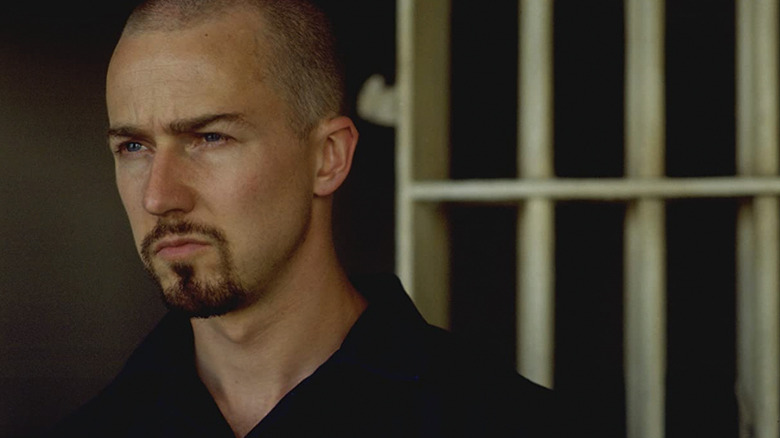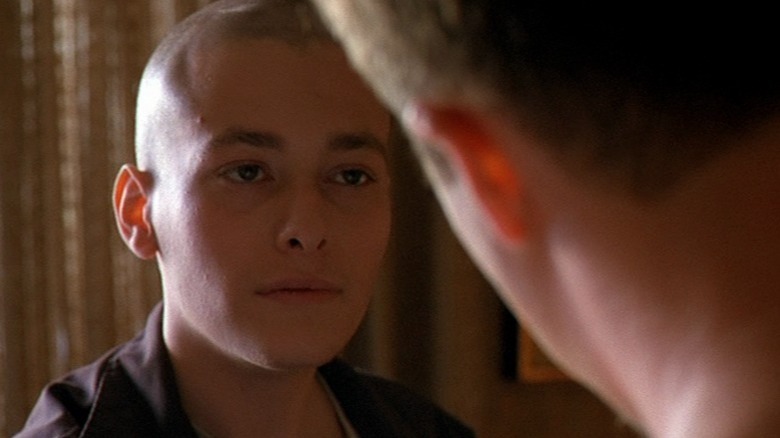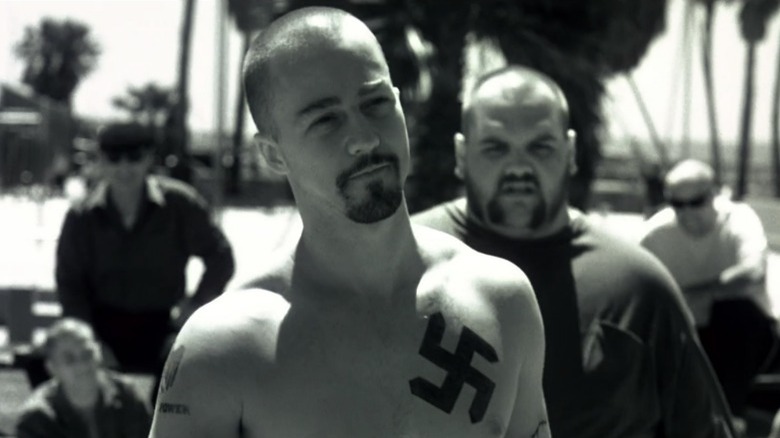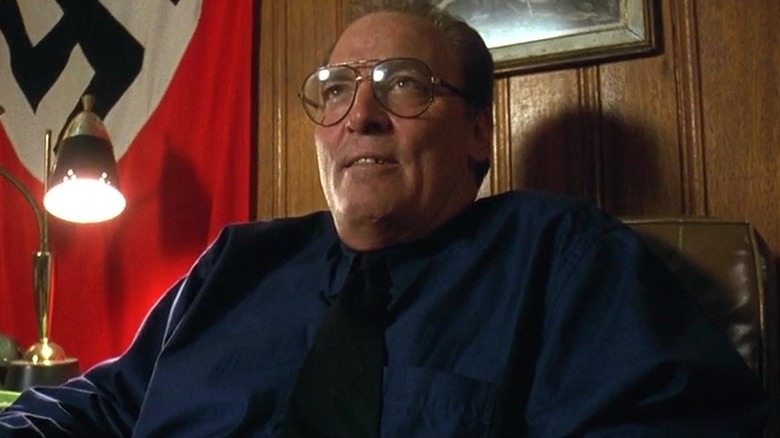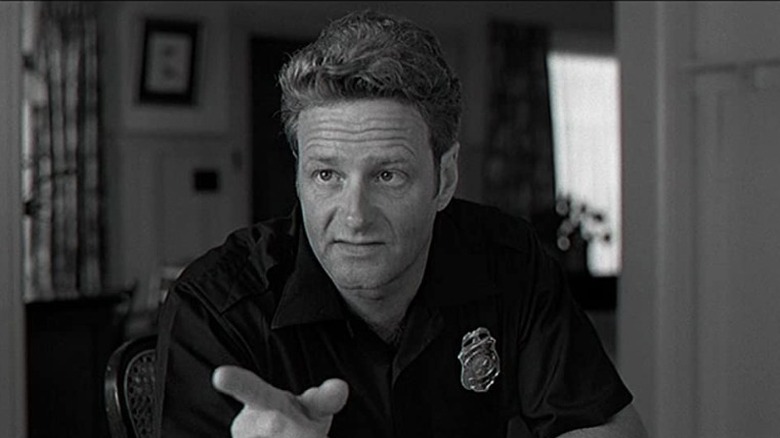American History X Ending Explained: Racism Begins At Home
Is "American History X" empty provocation? Is it apologia for white supremacist gang culture? Is it a profoundly sad document of the tensions dominating '90s Los Angeles? The movie continues to be shocking and troubling as the years pass, from its shootout opening to its brutal, contradictory ending. Tony Kaye's 1998 film (which he would attempt to disown in very public confrontations with New Line Cinema) deals directly with racism and the environment that powers it. Focusing on prejudice from the perspective of racists in the crucible of gang violence was an inspired choice.
The movie's mood is set up by its opening titles, with Anne Dudley's score (sounding like doom; she used strings and a boy's choir to emphasize the neo-Nazis) over grainy, black-and-white images of Venice Beach. There's a suggestion of faded majesty, which point-of-view character Danny Vinyard (Edward Furlong) alludes to in voiceover, claiming "this used to be a good neighborhood." He heard that from his dad, a firefighter killed by gangs.
Danny's the perspective character, but his brother, Derek (Edward Norton, in one of his best roles) is the movie's center — in flashbacks, an electrifying firebrand capable of driving masses of neo-Nazis to great violence, and in the present day, a contemplative, reflective figure who's seen the error of his ways.
The child is confused
For young Danny, Derek is a hero. The movie casts his recollections in high contrast black-and-white – beginning with him spotting Derek's car getting broken into by "two Black guys." Derek's response is to shoot at them, eventually curbstomping one of them in a horrifically authentic scene. It's an unsettling sight, with Edward Norton uncharacteristically buff, a large swastika tattoo on his chest. He faces the camera with a glimmer in his eye, as if this chance to commit violence is some kind of wish fulfillment.
Derek has been in jail since then, and in his absence, Danny has fallen in with the Disciples of Christ (D.O.C.), the white supremacist gang that his brother used to run with mentor Cameron Alexander (Stacy Keach). Danny's teachers, the Black Dr. Sweeney (Avery Brooks) and the Jewish Murray (Elliot Gould), discuss his latest provocation, a book report on "Mein Kampf." Sweeney gives Danny a new assignment: an essay on his brother. Danny has spent three years remembering his brother as a hero of the neo-Nazi cause, but he doesn't recognize the man he sees coming out of jail later that day.
Meanwhile, Danny upholds the D.O.C. ideals, antagonizing a group of Black students that are bullying a white kid in the school restroom. He returns home, reuniting with his brother.
Reunions and memories
Derek has hair now, and Danny hates it. So does Seth (Ethan Suplee), Derek's former best friend, a white supremacist cartoon who drives to the Vinyard home blasting a racist parody of "Battle Hymn of the Republic." The women in Derek's life are happy he's seemingly past the neo-Nazi phase. The men are disappointed.
The real story of the movie (and many of its most haunting scenes) comes as Danny writes his paper. Reflecting on Derek's life, he remembers the moments that made him look up to his brother: Derek winning a game of basketball against a Black gang (his eventual victims), Derek mobilizing the D.O.C. to destroy a Korean grocery store, Derek arguing at a family dinner about Rodney King and the L.A. riots. Dudley's score swells at climactic moments, suggesting a twisted heroism. In voiceover, Danny comments that Derek was "protecting white people" from non-white gangs. Danny's been indoctrinated. But Derek wants nothing of that life anymore.
Edward Norton's deep commitment to "American History X" went beyond acting. Despite being opposed to the casting at first, director Tony Kaye came to respect Norton as a collaborator, using his instincts for improvisation to rework the script. Norton's never better than in the movie's intimate family scenes, his subtle disappointments in the present and his unchecked anger in the past.
The chickenhawk and the jailbird
Edward Norton might have wanted audiences to perceive David Fincher's "Fight Club" as a comedy to keep a certain sense of distance from that material's harder edge, but "American History X" has no comedy. The tensions at its center come to a head as Derek reunites with his old cohort.
Cameron, the D.O.C. leader, wanted Derek to be his messenger who would mobilize disaffected white youth, and his imprisonment sealed the deal. But when Derek arrives at the D.O.C. party, he barges in on Cameron grooming Danny to be his next leader. Derek tells Danny to leave, and punches out Cameron. The neo-Nazis turn on him. Even his oldest friend Seth pulls a gun on him. The hero worship was conditional.
Derek confesses to Danny how his prison experience changed him. Flashbacks to jail time show his attempts to befriend the Aryan Brotherhood, and how he wants out when he sees that their values came second to drugs. Years spent working with Black inmate Lamont (Guy Torry) in the prison laundry soften his racism, and he abandons it completely after being violently sexually assaulted by members of the Aryan Brotherhood.
It's Dr. Sweeney, his old Black high school teacher, who visits him in the hospital. The D.O.C. never does.
He gives Derek a new perspective on how to navigate life. Derek sits alone at lunch, protected for the next couple years by his only true friend, Lamont. This is his big lesson to his brother, who tears the Nazi memorabilia off his bedroom wall.
Racism begins at home
Danny finishes his essay, recalling what their dad (William Russ) was like. Far from the noble firefighter to whom they've alluded, he was an out-and-out racist. Russ brings the warm sitcom dad energy honed from years of "Boy Meets World," making it all the more shocking when he uses slurs. Danny realizes the seeds of his brother's bigotry were planted a lot earlier than when he joined the D.O.C.
The next day, as both of the brothers prepare to turn over a new leaf, Danny gets shot in the bathroom, by the same Black teen he fought with the day before. Derek soon arrives to hold Danny's corpse.
For a movie with such a profoundly realized anti-racist message, this endnote feels egregious. The tragedy is self-conscious, a way to keep the movie's hard edge after such a sentimental resolution. It complicates the movie's tolerance message, and in turn we reflect on how one-dimensional the movie's Black characters have been. While the performances are excellent, Lamont and Sweeney both exist solely for Derek's journey towards tolerance.
Much of "American History X" resembles the '90s work of Spike Lee, which makes sense given how much star Edward Norton was impacted by the director. It has Lee's direct address, and his willingness to seriously consider racism at all levels. But its shock and edge take precedence over the nuance it purports to have. For all of its visceral impact, the movie's contradictory nature feels more scattered than intentionally complicated.
